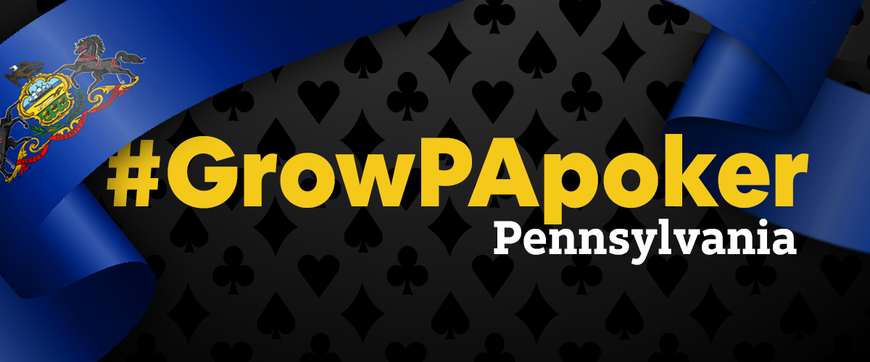

It’s been one month since pokerfuse launched an advocacy campaign calling for Pennsylvania to allow multi-state online poker, under the hashtag #GrowPApoker.
With the campaign entering its second month, we need help from online poker players to keep the pressure on lawmakers in the Keystone State! If the campaign is successful, players will be able to enjoy the benefits from shared liquidity — namely, bigger tournaments and prize pools.
The campaign started out as an effort designed to encourage players to reach out to Governor Josh Shapiro and two House lawmakers, and to tell them they support Pennsylvania becoming a member of the Multi-State Internet Gaming Agreement (MSIGA).
John Pappas, former executive director of the Poker Players Alliance (PPA), told pokerfuse in an exclusive interview earlier this month that he thought the campaign was “off to a great start.” That’s quite a compliment, considering the PPA led the push for multi-state online poker back in the early 2010s.
To recap, if Pennsylvania were to join MSIGA, operators would be able to share liquidity across other member states (Delaware, Michigan, Nevada, New Jersey, and West Virginia). The two most likely ways PA would join the compact, at this stage, are:
- Shapiro signs an executive order authorizing the state regulator to request an application for Pennsylvania to join MSIGA
- Lawmakers pass HB 2078, a bill that would direct the regulator to do the same
Pappas suggested that #GrowPApoker should be expanded to include all lawmakers in the Pennsylvania General Assembly, not just the bill’s sponsor and the governor. He also suggested that players engage with the state regulator, the Pennsylvania Gaming Control Board (PGCB).
Here is how #GrowPApoker is unfolding and how PA players can help.
Use Social Media to Engage PA Lawmakers
While it’s likely that most of the politicians that Pappas and the PPA engaged with back in the early 2010s have since left office, Pappas told pokerfuse that “we have a younger generation of lawmakers that are in office today, that would be more accepting [of multi-state online poker].”
He added that social media “is one of the top ways of communicating with lawmakers today. They’re very heightened and aware of what’s happening on their social media channels — that’s just a really great way to directly interact with a lawmaker.”
Pappas said players should keep a few basics in mind. “Obviously, you’ve got to tag the lawmaker in there, make sure that you’re using the right account. Sometimes lawmakers have multiple accounts.” He also said to check to see when the lawmaker’s last post to a social media.
Using Twitter as an example, Pappas said “make sure that they’re actually active on Twitter. If the last time they posted was sometime in 2022, then maybe a tweet isn’t going to be the best way to communicate with this lawmaker because they’ve decided that Twitter’s not a platform for them.”
Tips
- Tag the PA lawmaker
- Make sure that you’re using the right social media account
- Check to ensure the lawmaker is actually active on the platform
Try to Meet a PA Lawmaker at a Local Event
Pappas said getting a meeting with a state lawmaker is a more difficult task than trying to track them down to a local event. He said players would have better luck calling the lawmaker’s office to ask what their public schedule is, and to try to catch them at such an event to raise the issue of multi-state poker.
“We are conveying a message that this is important to us, and we need to do so in a way that the lawmakers realize that, 'Hey, this isn’t some fringe person who wants this. This is a mainstream desire, and the way they’re communicating with me is a very mainstream way.”
Tips
- Call the PA lawmaker’s office to see if they will be at any local public events
- If you have the opportunity, try to raise the issue with the lawmaker
- Be respectful
What to Say In Person/Correspondence
It’s important to mention the benefits created by shared liquidity. As we outlined in our #GrowPApoker lander guide, shared liquidity benefits players by:
- Creating bigger tournaments and prize pools
- Offering more poker games during times when players want to play, not just peak times
- Having a wider variety of poker variants available
But that’s not all. Shared liquidity benefits the state, too, through:
- Increased consumer protections against online poker fraud
- Extending responsible gaming (RG) protections to PA players that unavailable on illegal offshore sites
- Additional tax revenue
“I would imagine a shared player pool could probably double the amount of revenue that the state is getting, and in these economic times, I think every dollar is going to be important to a state,” Pappas said.
“There’s clear benefit to you as a player, and that should be motivating you, but you also have to understand that lawmakers have to see it from both sides — what’s good for the consumer, but what also is good for their state.”
Tips
- Be sure to mention that shared liquidity will increase consumer fraud protections
- It will also lead to wider RG protections
- Tax revenue will also increase (it could double)
Reach Out to the Regulator
Pappas added that it was “completely appropriate” for players to reach out to the state’s gaming regulator, the Pennsylvania Gaming Control Board (PGCB). He suggested that players consider:
- Tagging the PGCB on social media (@PAGamingControl on X)
- Sending an email to the PGCB
- Mailing a letter to the regulator
- Calling PGCB offices
- Attend PGCB meetings and sign up to speak during the public comment period (if available)
“[PGCB] are definitely reachable on social,” Pappas said. “They have public meetings. Generally, at the end of those meetings, there’s an opportunity for the public to weigh in on matters. I think that’s certainly appropriate. A letter-writing campaign to the commission [would be useful] as well.”
Tips
- Post to social media on X (formerly Twitter): @PAGamingControl, Facebook, and/or LinkedIn
- Send an email: mailto:pgcb@pa.gov
- Call them directly: (717) 346-8300
- Write and mail a letter:
Pennsylvania Gaming Control Board
303 Walnut Street
Commonwealth Tower, 5th Floor
Harrisburg, PA 17101

